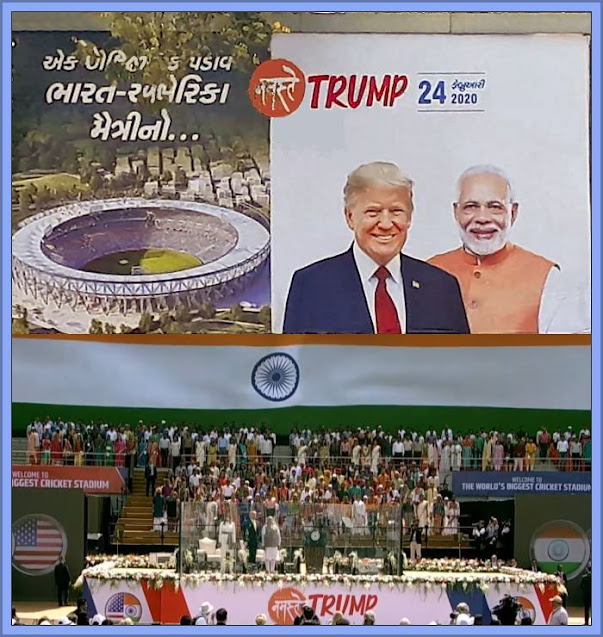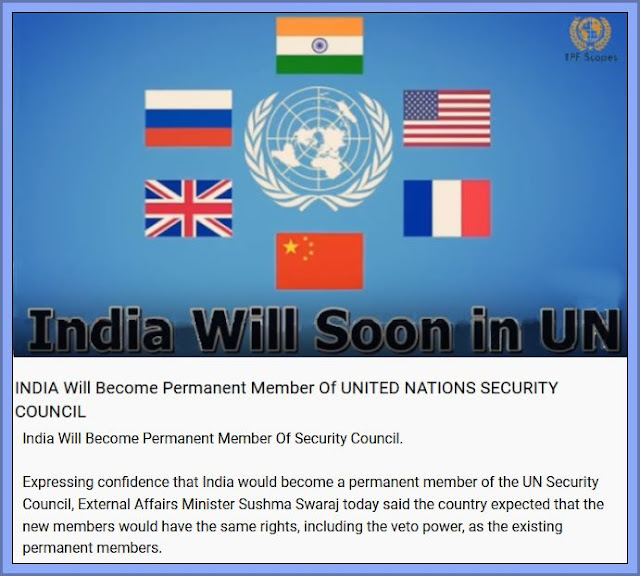 |
| Trump And Modi Enjoyed The Big Stage ..... |
Such talk has occasionally popped up for at least the last 20 years, but the country is seemingly no nearer that status now, than then.
Its a dream that's held mainly by rich Indians and politicians. In reality it's doubtful if the country can ever become a true 'superpower' .... or should even aspire to be so, especially as it has a rising behemoth, in the form of China, as an increasingly assertive real superpower as its northern neighbour.
Given the regional geo-political realities, even the notion that India is an 'emerging superpower' is a faintly ridiculous one, when all any Indian politician has to do is drive a few miles outside of any large conurbation in to rural India, for a graphic flashback into the 18th century, or even just walk to a nearby slum to see disease, hunger and misery that would, and should, shame Victorians, let alone any state wanting to be a superpower in the 21st Century (not that China doesn't also have these issues, but as a Communist state, it can have a political direction and policy coherence that India's chaotic democracy never can).
 |
| India's Top Table Dreams Expressed In Bad English On You Tube |
Despite India's impressive economic achievements, it is not a global a superpower and for any number of reasons it will probably fail to become so - here's a few obvious ones:
- An increasing gap between the very rich and the very poor.
- The lack of a serious media accountability.
- The rampant Hindu nationalism, as espoused by the ruling BJP, that marginalises a large number of its citizens.
- The internecine religious violence between Hindu's and Muslims.
- The sustainability of resource consumption and and resultant environmental degradation of the current Indian economic model.
- Economic and policy incoherence that favours the already wealthy, over the very poor and often has feudalistic overtones.
- 75% of all homes comprise of two rooms or less, with most people sharing a room, that's approx 900m people.
- Overpopulation - India is a country with more than 1.3 billion people and has a population density of 464 per sq km - in China, the world's most populous country, it is 153 per sq km and in the US it's just 36 per sq km. Never going to have enough resources.
Whilst Economic growth rates over the past few years have been notable, the benefits of this growth have been confined to the middle class and the rich. The poor still do not have homes, basic sanitation, decent schools or regular good quality food.
A London School of Economics study, by nine Indian Academics in 2012 found that "India still faces major developmental challenges. The still-entrenched divisions of caste structure are being compounded by the emergence of new inequalities of wealth stemming from India's economic success.''
These inequalities include the fact that 700 million or so Indians live in poverty, and that little or no effort is made to meet these poor citizen's most basic needs - enough to eat, access to basic health care, clean drinking water, safe toilets and electricity.
But affluent Indians who have bought in to the superpower idea, still tend to get all puffed up the moment the country manages any achievement such as a rocket launch, or a minor international award for some Indian film, or a bronze or silver medal in a sport or competition that no one watches, all of which are trumpeted as evidence that India has conquered the world.
The reality is that:
- Around 400 million Indians have no electricity.
- India has more mobile phones than toilets.
- Millions of children are not in school.
- Most cities have no sewage treatment systems, and no major city has a continuous water supply.
- Preventable diseases are rampant.
- The countries infrastructure is pitiful, and
- One UNICEF report stated that there is acute malnutrition and hunger among the urban poor, with 54 per cent more infants dying from among the urban poor, than from the urban non-poor.
- Whilst another UNICEF report found that 93 million Indians live in urban slums, or on pavements and construction sites.
Yet if anyone raises their heads above the parapets of fortress nationalism, and points these facts out, they will be subjected to heated and sometimes violent criticism. Getting to the top table takes more than just a fast growing economy and a nuclear bomb, it also requires a reasonably equitable distribution of wealth, health and opportunity at home, combined with a sense of purpose or mission abroad .... India lacks all these aspects. China on the other hand, has policies in place to achieve all these aims, which although patchily delivered at home, are coherent, whilst abroad there is no doubting their aggressive top table status.
As Amrit Dhillon, an Indian writer pointed out (from the safety of a foreign newspaper report):
"It hurts the pride of Indians to be reminded of the country's poverty. But the existence of poverty itself does not hurt their pride." ... until that statement fails to be true, India will never realise top table status.

India can put rockets in space, build nuclear weapons and claim top table status, but can't provide safe water or toilets to millions of their citizens.
ReplyDeletehttps://www.bbc.co.uk/news/world-asia-india-61679615
Fair comment. India has come a long way in the last 80 years but failing to curb the birth rate has meant millions remain in poverty. Thanks for (both?) the comments.
Delete